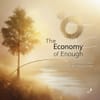In this piece, Jacob William argues that true sustainability lies in finding the balance between scarcity and excess: the state he calls “enough.” He begins by challenging the widely-accepted metric of progress as more—more growth, more data, more reach—but observes that this relentless expansion often leaves us feeling less complete. The idea of “enough” isn’t surrender, he writes, but rather a quiet centre of wisdom where ambition transforms into meaningful contribution.
He goes on to critique the prevailing belief in scarcity. Entire industries thrive on the illusion that we lack time, relevance, or value, and that constant striving is the only path forward. But William suggests that “enough” isn’t a number—it’s a relationship between usefulness and contentment. He emphasizes that when we lose proportion and mistake movement for progress, we trade purpose for distraction.
Technology, he notes, amplifies this tension. Algorithms deliver more—more choices, more noise, more inputs—but that very abundance can lead to overload. Under this framework, the value shifts: no longer “How much did we make?” but rather “Does this create wholeness, or just motion?” This re-orientation is central to the economy of enough.
In concluding sections, William proposes that future success will be defined not by scale but by balance. Organisations that thrive will know when to grow, when to pause, and when to give back. He writes that “enough is not mediocrity—it is mastery without greed.” When innovation becomes restorative instead of extractive, the result is abundance with boundaries, and that is what endures.


